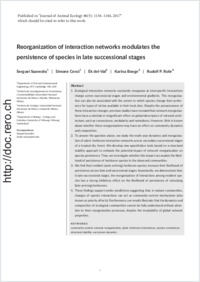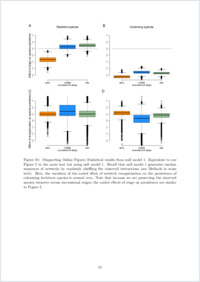Reorganization of interaction networks modulates the persistence of species in late successional stages
- Saavedra, Serguei Department of Civil and Environmental Engineering, MIT, Cambridge, MA, USA
- Cenci, Simone Department of Civil and Environmental Engineering, MIT, Cambridge, MA, USA
- del-Val, Ek Instituto de Investigaciones en Ecosistemas y Sustentabilidad, Universidad Nacional Autónoma de México, México
- Boege, Karina Instituto de Ecología, Universidad Nacional Autónoma de México, México
- Rohr, Rudolf P. Department of Biology - Ecology and Evolution, University of Fribourg, Switzerland
-
01.09.2017
Published in:
- Journal of Animal Ecology. - 2017, vol. 86, no. 5, p. 1136–1146
community control
network reorganization
plant–herbivore interactions
species coexistence
structural stability
succession dynamics
English
Ecological interaction networks constantly reorganize as interspecific interactions change across successional stages and environmental gradients. This reorganization can also be associated with the extent to which species change their preference for types of niches available in their local sites. Despite the pervasiveness of these interaction changes, previous studies have revealed that network reorganizations have a minimal or insignificant effect on global descriptors of network architecture, such as connectance, modularity and nestedness. However, little is known about whether these reorganizations may have an effect on community dynamics and composition.To answer the question above, we study the multi-year dynamics and reorganization of plant–herbivore interaction networks across secondary successional stages of a tropical dry forest. We develop new quantitative tools based on a structural stability approach to estimate the potential impact of network reorganization on species persistence. Then, we investigate whether this impact can explain the likelihood of persistence of herbivore species in the observed communities.We find that resident (early-arriving) herbivore species increase their likelihood of persistence across time and successional stages. Importantly, we demonstrate that, in late successional stages, the reorganization of interactions among resident species has a strong inhibitory effect on the likelihood of persistence of colonizing (late-arriving) herbivores.These findings support earlier predictions suggesting that, in mature communities, changes of species interactions can act as community-control mechanisms (also known as priority effects). Furthermore, our results illustrate that the dynamics and composition of ecological communities cannot be fully understood without attention to their reorganization processes, despite the invariability of global network properties.
- Faculty
- Faculté des sciences et de médecine
- Department
- Département de Biologie
- Language
-
- English
- Classification
- Biological sciences
- License
- License undefined
- Identifiers
-
- RERO DOC 305618
- DOI 10.1111/1365-2656.12710
- Persistent URL
- https://folia.unifr.ch/unifr/documents/306047
Other files
Statistics
Document views: 71
File downloads:
- roh_rin.pdf: 123
- roh_rin_sm.pdf: 103

